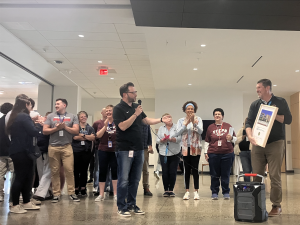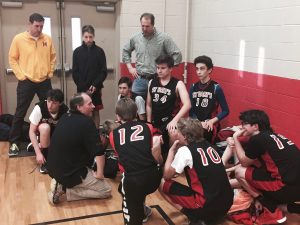Grammar & Editing Appendix
Standard Editing Marks & Jargon
These are some words that your editors will use on your story to improve your writing.
awk = awkward phrasing
cap = capitalization error
FC = fact check
frag = sentence fragment
para = needs a paragraph break (usually because paragraph is too long)
pro = pronoun error
RO = run on sentence
sp = spelling error
wc = word choice (consider choosing a different word)
wordy = too wordy
? = sentence/phrase doesn’t make sense
strikethrough = sometimes an editor will delete a word or sentence for clarity, redundancy, or to improve the story. If the editor wants you to see what was deleted, he/she will show this with a line through the word/sentence
Attribution
Always use person + said
- “Prom was magical,” Carolyn Worley, said.
- “Prom was much better than last year,” Blaise Sevier, junior, said.
If long title is necessary, put title first
- “Prom was magical,” said junior class president Carolyn Worley.
- “We definitely could have played better,” said defensive lineman Nick Casillas.
Break a long quote and put the attribution early.
- “Prom was magical,” Worley said. “I’m really very proud of what we accomplished.”
- “In terms of our defense,” Casillas said, “We definitely could have played better.”
It’s OK to pick and choose the quote you want to use, but you can NEVER alter a quote from a source (except for grammar). For example, compare these notes of the interview with Nick Casillas with the quote chosen above:
| I mean, we played pretty bad. I won’t deny it. The defense was , like, way off from the start. They’re like throwing every play, we’re backpedaling. I wanna just stay on the field give the O a rest. So yeah, in terms of our defense, we could have played better. |
The first time you mention someone in an article, use the person’s full title, first and last name. Every time after that, refer only to his or her last name.
- Principal Byrd declared every Friday a holiday. This news comes after Byrd met with the Dhali Llama at a conference on peace.
Students
Give the class (freshman, sophomore, junior, senior) of a GMHS high school student.
- Daniel Donovan, senior, said.
Provide the class and school of any student attending a high school or college other than GMHS.
- John Doe, senior at George C. Marshall High School.
For elementary and middle school students, use “first grader,” “seventh grader,” etc. This should precede the name.
- “I love ice cream,” seventh-grader Jane Doe said.
Teachers
Provide the subject(s) the teacher teaches and any additional title he or she holds if it applies to the article.
- Ms. Karin Tooze, english teacher and Nine Muses adviser, approves of the plan to make poetry mandatory in math class
- Use full name with title for first mention: Ms. Karin Tooze, [title] said.
- Use only last name for second mention: Ms. Tooze said.
Other adults
The title should be relevant to why this specific person was interviewed. Give the job title and location if they apply to the article. If age or location applies put it in the person’s title. If the adult is interviewed because he or she is a parent, “parent” should be his or her title.
- Al Franken, the senator from Minnesota, voted to make corporal punishment legal again.
- Al Franken, who is 58 and not from Virginia, voted to make corporal punishment legal again.
- Billy Beaver, a Falls Church parent, approves of the plan to make corporal punishment legal again.
Use full name with first mention: Al Franken said.
Use only last name for second mention: Franken said.
Titles
LOWERCASE: When the title is not part of the person’s name in the sentence, it is lowercase. So:
- The president issued a statement.
- The pope gave his blessing today in Rome.
- The president, Barack Obama, was re-elected in 2012.
- Pope Francis, the current pope, was born in Argentina
- Mr. Byrd, the current principal, went to high school in Arlington.
CAPITALIZE: Formal titles when they appear immediately before the person’s name (as an adjective). So:
- President Obama issued a statement.
- Pope Francis gave his blessing today in Rome.
- Principal Byrd went to high school in Arlington.
***An occupation is not a formal title. Do not capitalize “astronaut” or “movie star”
Courtesy Titles
As deference to the faculty and administrators at George Mason, The Lasso shall use courtesy titles (Mr., Ms.) before the full name of the faculty member. To avoid confusion about marital status, The Lasso shall use “Ms.” to refer to all female members of faculty and administration. The courtesy title shall be used in both first and second reference.
- According to Mr. William Snyder, math teacher, the sky isn’t blue.
- Mr. Snyder declined further comment.
- However, Ms. Jennifer Jayson, math teacher, disagreed with Mr. Snyder.
- In Ms. Jayson’s opinion, the sky is, in fact, blue.
Titles of books, plays, movies, etc.
Unlike in English class, titles are not italicized or underlined in newspapers. Instead, they are placed in quotes.
- “The Da Vinci Code” has been on the bestseller list for weeks.
- She starred in the musical “Phantom of the Opera.”
This applies to titles of books, plays, movies, poems, articles, songs and albums. It does not apply to the titles of magazines or newspapers.
Pronouns
Second-person
- Avoid using “you” unless it is a direct quotation
- It can be replaced with “one,” “people,” “students,” “an individual,” etc.
First-person
- Avoid using “I” in all objective news stories.
- Only use if writing opinion/editorial/review or if use of “I” is approved by editor.
Contractions
- Avoid using contractions in all objective news stories. Contractions convey an informal, light-hearted tone, which is generally not appropriate for news articles.
- Only use if this style fits for an opinion/editorial/review/features piece
- If a contraction is used by a source in a direct quote, it should not be changed.
Numbers
- Numbers one through nine are spelled out as words (one, two, etc…)
- Numbers 10 and up are written in Arabic numerals unless they begin a sentence.
- Jeff has only been to King’s Dominion three times, but Tanya has been more than 20 times in her life.
- Twelve years ago he taught kindergarten in Berkeley. (spell out)
- He taught kindergarten in Berkeley 12 years ago. (don’t spell out)
- Fifty-five percent of students agree. (spell out)
- In a survey, 55 percent of students agree. (don’t spell out)
Whenever a number is the first word in a sentence, it is always spelled except if it is a year.
- Four hundred thirty-nine fans crowded the stands at last night’s game.
- At last night’s basketball game, a record 439 fans filled the seats.
- 1986 was the last time the baseball team won a state title.
- The last time the baseball team won a state title was 1986
One million and up should be spelled out, as below:
- He donated $1.5 million to charity.
- “If I had a million dollars,” she said, “I would buy Frady Park.”
- The bank processes $2.5 billion every year.
Exceptions to the “spell-it-out” rule:
- Sports scores should be written as ratios.
- The score of the game was 3-0.
- Rank or priority
- “Smith is our No. 1 player,” Coach Smith said.
- “Preparing for an earthquake is not my No. 1 priority right now,” Healey said. “It’s about No. 3 or 4.”
- Headlines
- 2 students win at state
- VCU accepts 7 new students
- Money
- For $10, students can buy a ticket to the play.
- “In my day you could buy candy for 5 cents,” he said.
- The bill came to $145.05.
- Age, as in 2-year-old
- The 2-year-old threw a tantrum. (don’t spell out)
- She is a 9-year-old in Algebra I. (don’t spell out)
- She is nine years old. (spell out)
- Percents
- Barely 2 percent of parents agree, according to the latest parent survey.
***Never use % symbol — always spell “percent”
- Time
- See “Time.”
Dates
HOW TO WRITE DATES
- The dance was held on February 21. <–YES
- The dance was held on the 21st of February. <–NO
- The dance was held on February 21st. <–NO
- Are you going to the parade on the Fourth of July? <–OK
- Are you going to the parade on July 4 ? <–YES
- Are you going to the parade on July 4th? <–NO
Abbreviate certain months and do not list the year or day of the week unless absolutely necessary (such as dates in history or in the future). Never mention the year if it is the current year.
- The first day of school was Sept. 2.
- The last day of school is June 18.
ABBREVIATE: Jan., Feb., Aug., Sept., Oct., Nov., Dec.
NO ABBREVIATE: March, April, May, June, July
If using day of the week, always add date too.
- The play will run Thursday, Friday, and Saturday (March 28, 29, 30).
- The last game of the season is tomorrow, May 17.
- Never refer to days as “next Wednesday” or “last Friday.”
Time
HOW TO WRITE TIME:
- It began at 3:00 p.m., 25 minutes after school had ended. <–YES
- “At 2 a.m.?” she asked. <–NO
- The game lasted until 7pm <–NO
- The game lasted until 7:30 p.m. <–YES
- School now starts at 9:00 am <–NO
Always use “a.m.” or “p.m.” Use lowercase and remember the periods after each letter.
Abbreviations
Do not use abbreviations the reader will not recognize on first reference. Keep the audience in mind when using abbreviations, and if in doubt, write it out.
Common abbreviations to note:
- FCCPS
- GMHS
- Washington, D.C.
Uncommon abbreviations, for example:
- FDNY (Fire Department of New York)
- ASNE (American Society of News Editors)
- MLBPA (Major League Baseball Player’s Association)
Active v. passive voice
Stop using the passive voice immediately. It is for the weak-willed.
- Examples: (subject is bold/underlined):
- Active (good): “Journalists should always use the active voice.”
- Passive (bad): “The active voice should always be used by journalists”
- Further examples:
- BAD: The poorer people were deprived of their opportunities. (passive voice)
- GOOD: Harsh immigration laws deprive poorer people of opportunities. (active voice)
- BAD: Documents were cited to prove that an estimated 12 to 20 million illegal immigrants have been admitted to the United States. (passive voice)
- GOOD: State Department officials estimate the number of illegal immigrants at from 12 to 20 million. (active voice)
- BAD: Talks have been conducted on the subject of starting a worker program for the illegal immigrants. (passive voice)
- GOOD: President Bush has proposed starting a [guest] worker program for the illegal immigrants. (active voice)
If you can say something with fewer words, you probably should.
Affect vs. effect
Affect = verb
Effect = noun
Its vs. it’s
- “It’s” is the contraction of “it is.”
- “It’s a great thing to do,” Lee said.
- “Its” is the possessive pronoun of “it.”
- Each class has its own personality, Brown said.
Me vs. I
Use “I” if you are the subject of the sentence.
- I went to the store.
- I checked out the book from the library.
- My friend and I at all the tacos.
Use “me” if you are NOT the subject of the sentence.
- Give the pencil to me.
- Daniel told me he was going to ace the test.
- Never let me hear you do that again.
***A helpful trick: Replace “me” with “I” and you will know which one to use***
Principal vs. principle
A “principal” is the head of a school. If used as title, capitalize it.
- Principal Tyrone Byrd announced school would be canceled tomorrow, Feb. 21.
- Mr. Tyrone Byrd, the principal of GMHS, announced school would be canceled tomorrow, Feb. 21
***Note that “assistant principal” not “vice principal” is the official title at GMHS**
A “principle” is a standard, rule or attitude.
- One of the key principles of her life was honesty.
They vs. he vs. she
“They” is plural. Do not substitute it for the singular
- BAD: A student should know what they want to do.
- GOOD: A student should know what he or she wants to do.
- BAD: Everyone should bring their ID card.
- GOOD: Everyone should bring his or her student ID card.
This also applies to “their” and “them.”
- Each person got his or her own grade.
Who vs. that vs. which
who = people, named animals
- Brown, who will graduate in two months, is nervous about college.
- Students who pay attention do not necessarily perform well on tests, he said.
- Cookie, who used to bark at strangers, ran away last year.
that = unnamed animals, inanimate objects, groups, ideas. Do not use “that” or “which” for people.
- The companies that lost the most money were mostly Internet companies.
- The dog that Marcus brought to class is the one that ate all the cookies.
which = unnamed animals, inanimate objects, groups, ideas (USED AFTER A COMMA)
- Honestly, that idea, which is the same one I said yesterday, is the best.
- The dog, which Marcus brought to class, ate all the cookies.
TIPS:
To make sentences shorter, leave out “that” if the sentence makes sense without it.
- He wishes that people would pick up their garbage.
- The bill was created so that the school would be safer.
“Whose” should be used for “who” words and “of which” for “that” and “which” words.
- Sally Brown, whose car was stolen last year, now walks to school.
- The wall, the paint of which is peeling, will receive a new coat next month.
As a question word, “which” is used instead of “what” when there are choices. “What” is used when there are no defined choices.
- Which classes should I take?
- What does it mean?
You’re vs. your
“You’re” is the contraction of “you are.”
- You’re doing well.
- You’re welcome
“Your” is the possessive pronoun for “you.”
- You left your sweater on the sofa.
- Turn in your homework, please.
i.e. vs. e.g.
- e.g. = for example
- The menu is full of vegetarian options, e.g., “veggie lasagna” and “tofu surprise.”
- i.e. = that is
- Gratuity is already included in the bill, i.e., you don’t have to leave a tip.
The abbreviation “e.g.” is from Latin “exempli gratia” and means, literally, “for example.” It is used when the writer needs to provide a specific example of something.
The abbreviation “i.e.” means “that is” (“id est”). It is used when you need to explain something further or in a different way.
Latin endings
singular ending |
plural ending |
|
masculine |
-us |
-i |
feminine |
-a |
-ae |
neuter |
-um |
-a |
Common latin words we must get right:
- alumni (plural), alumnus (singular)
- media (plural), medium (singular)
***Note: “media” is plural, therefore correct usage is: “The media are…” NOT “The media is…”***
Commonly misspelled words
| a lot | cemetery | privilege |
| absence | definitely | receive |
| accommodate | dependent | relevant |
| advertisement | embarrass | reliant |
| alliance | library | separate |
| attach | license | though |
| business | necessary | |
| calendar | obsolete | |
| capitalize | occur |
Punctuation marks
| Name | Meaning | Example | OK to use? | Except… | |
| & | ampersand | and | My baby shampoo is made by Johnson & Johnson | N | if it is in the name of a business |
| ‘ | apostrophe | indicates possession (along with s) | That is Nicole’s book. | Y | when proper name ends in s That is Thomas’ book.That is Kansas’ flag.That is the hostess’s menu. |
|
|||||
| : | colon | introduce new clause or list | He had one true quest in life: going to Hawaii. The main principles of Buddhism are: charity, diligence, concentration… |
Y | |
| ; | semicolon | only use if you know exactly what you’re doing | |||
| ! | exclamation mark | excitement | The lacrosse game was really exciting! | N | |
| ? | question mark | questions | What did you say? | Y | |
| % | percent | percent | The budget is 50% done. | N | use word “percent” |
| ‘ | single quote | when someone is quoting someone else | “Then my coach just said, ‘Go out and hit the ball’ So I did,” said Harper. | Y | |
| ( ) | parentheses | ||||
| [ ] | brackets | indicates a missing word | “I have never seen [Spiderman] before,” said Mr. Byrd. [Spiderman] replaces “it” or “that” |
Y | Use this to clarify someone’s words – never invent things that are not said. Never use outside quotes. |
| — | dash | abrupt change; emphatic pause | Davis will graduate in June — if he passes English, that is. It was everything about the beach — the beauty, the size — that I loved. |
Y | Note that a — is different than a – |
| – | hyphen | to combine ideas into one | socio-economic
Washington-Lee The blue-green sea full-time job Mexican-American |
Y | |
| … | ellipses | indicates omission of original words | “Moments after that … his memory flung him back to his childhood.” (Vonnegut, 64) “In the instance of student safety … all precautionary measures will be taken.” |
Y | Never use at beginning or end of sentence |
Sports
- DO use apostrophe but DO NOT capitalize. So, “girls’ tennis” is correct.
- Avoid using “varsity” unless totally necessary. Generally speaking, the Lasso covers varsity sports. If you need to mention the JV team, use “JV” (not junior varsity).
- Identify player positions and years when possible. So:
- “Quarterback Sam Selby, senior, threw for 275 yards.”
- “Robert Tartt, junior forward, had three steals in the second half.”







